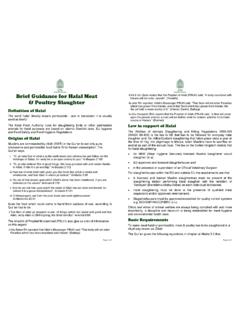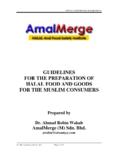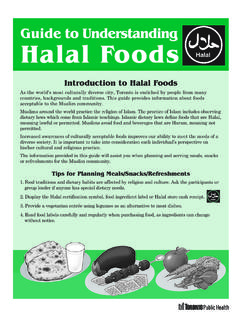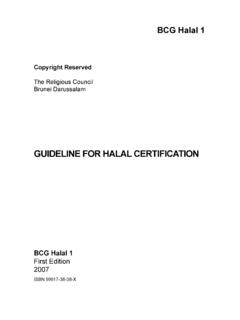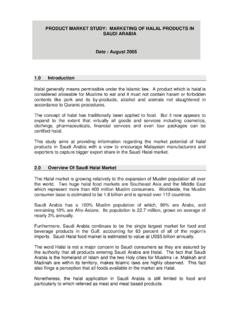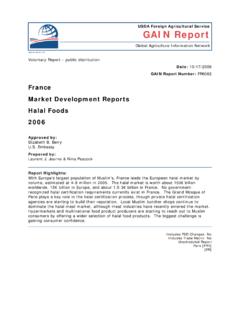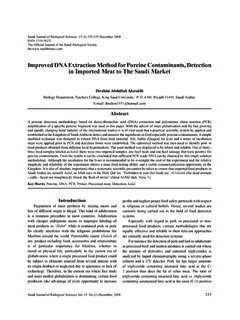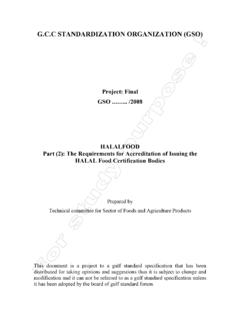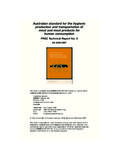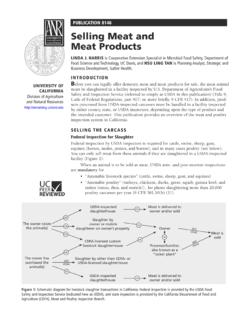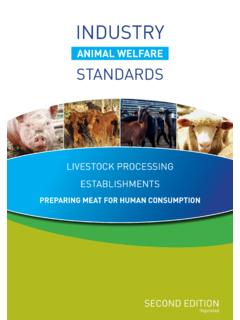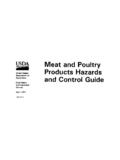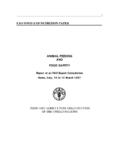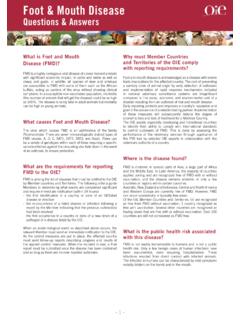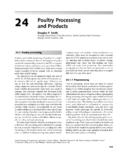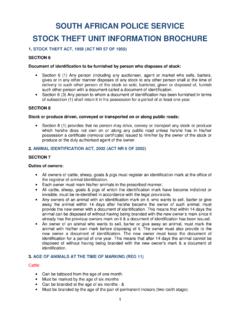Transcription of Halal Food and Certification by IFI - halalrc.org
1 Halal food and Certification by IFI Dietary regulations in Islam Summary of dietary regulations food and drink have direct effects on our physical and spiritual state. Islam has prohibited certain types of food and drink. The prohibition of these things is due to their impurity and harmfulness. The dietary regulations in Islam can be summarized as follows: 1. All things that Allah has created for humankind are permissible except what He has prohibited by an authentic and explicit text of the Qur an and Hadith (sayings of the Prophet Muhammad.) Accordingly, the sphere of prohibited thing is very limited in Islam. This principle of natural permissibility applies to all human actions, transactions and behavior with the exception of acts of worship that can only be done in accordance with the divine text. 2. Basically, four types of food have been deemed Haram "unlawful" for Muslims in the Qur an.
2 These are: i. The flesh of a dead animal (carrion). ii. Blood. iii. Pig meat. iv. Meat from any animal on which the name of someone other than Allah was invoked when it was slaughtered. 3. Intoxicants of any kind (alcohol, drugs etc.) are prohibited for Muslims to consume, even in small quantities. Alcohol should not form part of the ingredients of any food prepared for Muslims. 4. By implication, any product derived from the above prohibited food and drinks or any food containing ingredients from them will also be unlawful (Haram) 5. Animals permitted for human consumption under Islamic law include: cattle, sheep, goats, camels, deer, poultry etc. Carnivorous animals and birds of prey are not permitted. Animals permitted for human consumption must be slaughtered in a certain manner. 6. Fish and seafood is Halal for Muslims.
3 7. All vegetables are Halal and therefore, vegetarian food is acceptable to Muslims if it is free from alcohol and other Haram ingredients. Rule of Thumb In Islam, every thing is permitted ( Halal ) to consume except A B C D I S which are prohibited (Haram). These are: A: Alcohol and drugs B: Blood (Flowing or congealed) C: Carnivorous animals and birds of prey D: Dead animals / birds (that died of itself or died before slaughter .) I: Immolated food S: Swine and its by-products. Quick Guide Haram/Avoid - These are ingredients that are unquestionably Haram (prohibited). Examples are lard, which is 100% pork fat, or gin, which is an alcoholic beverage. Bacon Beer Pork Gin Gammon steaks Rum Rashers Scotch Lard Vodka animal Fat Whiskey animal Shortening Wine Mashbooh / Doubtful (Source unknown) - These are ingredients that are likely made from non- Halal sources unless one is sure about the origin Hydrolyzed animal Proteins Sausages Shortening Margarine Fat The Islamic method of slaughter Summary of conditions for Halal slaughter Islamic law requires that animals intended for human consumption be slain in a certain manner.
4 The conditions for Halal slaughter can be summarized as follows: The animal to be slaughtered must be from the categories that are permitted for Muslims to eat. The animal must be alive at the time of slaughter . No electric shock, bullet or any other means should be used before slaughtering. Using any such method may lead to the death of the animal before it is cut. Islam prohibits Muslims from eating any meat coming from an animal that is dead before slaughter . Muslims are also advised to avoid eating anything doubtful. The animal must be slaughtered by the use of a sharp knife. The knife must not kill due to its weight. If it kills due to the impact the meat may not be permissible. The windpipe (throat), food -tract (oesophagus) and the two jugular veins must be cut. The slaughtering must be done in one stroke without lifting the knife.
5 The knife should not be placed and lifted when slaughtering the animal . Slaughtering must be done by a sane adult Muslim. Animals slaughtered by apostates, idol worshippers, atheists etc. are not permissible. Animals slaughtered (not stunned prior to slaughter ) by the People of the Book (Jews and Christians.) The name of Allah must be invoked (mentioned) at the time of slaughtering by saying: Bismillah; wa Allahu Akbar. (In the Name of Allah; Allah is the Greatest.) If at the time of slaughtering the name of anyone else other than Allah is invoked ( animal sacrificed for him/her), then the meat becomes Haram "unlawful." If a Muslim forgets to invoke the name of Allah at the time of slaughtering, the meat will remain Halal . However, if he intentionally does not invoke the name of Allah, the meat becomes Haram. The head of the animal must not be cut off during slaughtering but later after the animal is completely dead, even the knife should not go deep into the spinal cord.
6 Skinning or cutting any part of the animal is not allowed before the animal is completely dead. Slaughtering must be made in the neck from the front (chest) to the back. The slaughtering must be done manually not by a machine, as one of the conditions is the intention, which is not found in a machine. The slaughtering should not be done on a production line where pigs are slaughtered. Any instrument used for slaughtering pigs should not be used in the Halal slaughtering. Customary and Desirable Practices When Slaughtering Water should be offered to the animal before slaughter , and it should not be slaughtered when hungry. The knife should be hidden from the animal , and slaughtering should be done out of sight of other animals waiting to be slaughtered. Animals should be killed in a comfortable way. Unnecessary suffering to them must be avoided.
7 The knife should be re-sharpened before slaughter . Storage, Processing and Transport of Halal Meat Meat chilled or frozen for export to Muslims should be stored in separate cold stores other than those in which pork or other non- Halal meat is stored. Meat minced or processed for Muslims should not be minced in the same machines used to mince pork or other non- Halal meat. Why stunning Animals Prior to slaughter cannot be accepted by Muslims? Much of the current debate surrounding the issue of religious and "humane" slaughter focuses on the supposed barbarity of the former and the assumed decency of the latter. Both methods deserve closer inspection to assess the claims of both camps. The Common Stunning Techniques are: The Captive Bolt Pistol - for cattle, calves and goats. Carbon Dioxide (CO2) / Chemical Strangulation - for pigs.
8 Electrical Stunning - for sheep. Electrified Water Bath - for poultry. Scientific and medical research proves that stunning animals prior to slaughter is CRUEL and PAINFUL as many animals remain conscious and paralysed due to improper stunning, re-stunning, bone shattering, suffocation, strangulation, bruising, depressed skull fracture, etc. (Grandin, Blackmore, Schulze, and other researchers.) It should be borne in mind that electricity is widely used around the world for torturing human beings (in prisons and detention centres), so how can we say with certainty that an animal stunned using electricity feels no pain? In fact, the Farm animal Welfare Council (FAWC) in the in its June 2003 report stated clearly: "IT IS DIFFICULT TO MEASURE PAIN AND DISTRESS DURING THE slaughter PROCESS IN AN OBJECTIVE SCIENTIFIC MANNER." (No. 194, Page 34) So why then religious slaughter is criticised as painful and cruel to animals, when the FAWC itself has got no objective scientific evidence to prove its assumption that the animal in religious slaughter "Feels significant pain and distress"?
9 The fact is that there is little or no pain in the religious slaughter (Schulze, Horder, Hill, Sir Evans, Burrow, Levinger, Bell, Openshaw, Hayhurst, etc). Some of the inhumane effects of pre-stunning include: Many animals die before they are cut (Hillman, Lawton, Glen, Gregory). According to FAWC, one third of chicken die before slaughter . The new method of stunning today is: STUN TO KILL before slaughter , which means the food is less healthy for us, as more blood stays inside the carcass. Causes blood splash into muscles and more harmful blood stays inside the meat (Gilbert, Blackmore). Retained blood in meat is a major cause of food poisoning & infections. Captive bolts should be discontinued in view of their detrimental effect on meat quality. (Marple, 1977.) Changes in the natural chemical constituents of the meat (Marple, Biala.)
10 Spread of BSE, especially when the captive bolt pistol is used in cows (European Commission Study, 2002) Fails in at least 15% of cases, so repeated stunning is necessary, resulting in repeated torture and cruelty. Causes stress to the animal in at least 7 research studies. Islam prohibits Muslims from eating any meat coming from an animal that is dead before the religious slaughter can take place, as well as the consumption of any blood in any amount. These two prohibitions may occur during stunning. Muslims are also advised to avoid eating anything doubtful. Furthermore, meat for human consumption should be natural wholesome and undamaged. As it is Muslims hold the view that stunning is not only unnecessary but is cruel and painful to the animal , and moreover affects the draining of blood from the carcass thereby producing inferior quality meat.
